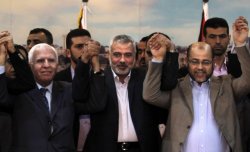 Israel said it will suspend Middle East peace talks because of the Palestinian Authority's reconciliation agreement with Hamas.
Israel said it will suspend Middle East peace talks because of the Palestinian Authority's reconciliation agreement with Hamas. Israel said it will suspend Middle East peace talks because of the Palestinian Authority's reconciliation agreement with Hamas.
Israel said it will suspend Middle East peace talks because of the Palestinian Authority's reconciliation agreement with Hamas.
The unanimous decision by Prime Minister Benjamin Netanyahu's inner security cabinet yesterday may be the final blow to U.S. Secretary of State John Kerry's campaign to resolve the Israeli-Palestinian conflict. It comes days before the April 29 deadline Kerry set in July for the talks to conclude.
Palestinian Authority President Mahmoud Abbas "signed an agreement with a murderous terrorist group that calls for Israel's destruction," Netanyahu said in a text message. "Whoever chooses Hamas's terror doesn't want peace."
Abbas's Fatah party and Hamas, which rules the Gaza Strip, announced an agreement April 23 to form a joint government within five weeks and hold elections within six months. The deal — the third of its kind since 2011 — was reached shortly after months of talks between Israel and Abbas' West Bank-based Palestinian Authority foundered at a critical juncture.
Netanyahu's decision to halt the talks "only reaffirms his lack of commitment towards a just settlement and the two-state solution," Hanan Ashrawi said in an e-mailed statement on behalf of the Palestine Liberation Organization's Executive Committee, of which she's a member.
She said the Fatah-Hamas accord is a "legitimate and legal step that brings all Palestinians under the same political umbrella."
Abbas assured United Nations Middle East Peace Process envoy Robert Serry that as part of the new unity government, Hamas will recognize Israel and commit to "non-violence and adherence to previous agreements," according to an e-mailed statement from Serry's office after the Dutch diplomat's meeting yesterday with the Palestinian Authority leader.
Abbas "also reiterated his continued commitment to peace negotiations and to non-violent popular protests," according to the UN statement.
The U.S.-brokered peace talks broke down in early April after Israel didn't go through with the last of four promised releases of Palestinian prisoners, then announced plans to build new homes in east Jerusalem, land the Palestinians claim for a future capital. Abbas retaliated by resuming the Palestinian campaign for greater statehood recognition outside negotiations.
"The Palestinian unity deal provided the Netanyahu government with an opportunity to exit peace talks that it never believed would yield any results, and joined only because of U.S. pressure," said Yoram Meital, a political science professor at Ben-Gurion University of the Negev. "The decision by Abbas to bring in Hamas played into the hands of Israeli hardliners in the coalition who were against the negotiations, and Netanyahu has taken advantage of that."
Kerry said that while he hasn't abandoned the possibility of reviving the talks, "the leaders have to make the compromises necessary to do that."
"We may see a way forward, but if they're not willing to make the compromises necessary, it becomes very elusive," he told reporters in Washington yesterday. "Right now, obviously, it's at a very difficult point."
Netanyahu said yesterday that Israel will take unspecified punitive steps in response to the Palestinian moves. Israel announced April 10 that it will deduct millions of dollars in debts from the customs tariffs and other fees it collects on behalf of the Palestinian Authority each month.
Israel is ready to return to peace talks if Abbas drops the Hamas deal, Netanyahu said.
"He still has the opportunity to reverse course, to go to the right direction, to abandon this pact with Hamas," the premier told NBC television. "I hope he does it."
Israel's benchmark TA-25 Index (TA-25) reversed gains after the pullout from talks was announced, falling 0.2 percent at the close. The shekel gained 0.2 percent against the dollar.
U.S. negotiators are still in Israel and in "close touch with both parties," State Department spokeswoman Jen Psaki told reporters in Washington. She said Kerry had spoken to Abbas and reiterated that any united Palestinian government must be committed to "nonviolence, recognition of the state of Israel and acceptance of previous agreements and obligations."
Hamas, considered a terrorist group by Israel, the U.S. and European Union for killing hundreds of Israelis in suicide bombings and other attacks, hasn't accepted any of those conditions in the past.
Jibril Rajoub, a leading Fatah official, said the deal with Hamas doesn't mean Abbas is backing away from peace efforts. Once a unity government is formed, Abbas will declare that it recognizes Israel and accepts other conditions the U.S. and Europe have demanded in exchange for dealing with Hamas. "There is nothing to worry about," Rajoub said yesterday on Israel's Army Radio.
A Fatah-Hamas unity administration formed in 2006 collapsed a year later after a violent clash between their forces in Gaza, leaving Abbas controlling the West Bank and Hamas governing Gaza. Reunification efforts since that time have failed because of disputes over details and implementation.
If this one succeeds, it may jeopardize U.S. funding to the Palestinian Authority, which is expected to reach $440 million this year, according to the Palestinian news agency Ma'an. U.S. law includes provisions that could shut off the funds if Hamas's role in the government increases.